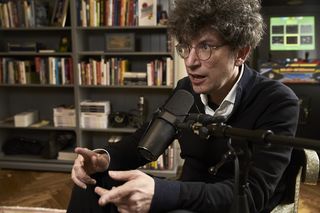Suicide
Interview With James Altucher: From Suicidal to Successful
AI, creativity and intelligence from the lens of an entrepreneurial polymath.
Posted February 13, 2020 Reviewed by Davia Sills

Sir Richard Branson, Arianna Huffington, Kai-Fu Lee, and Coolio have something in common. Each of them has been a guest on The James Altucher Show.
James Altucher is a successful podcast host, chess master, prolific writer, serial entrepreneur, stand-up comedian, and anything but ordinary. He has frequently appeared on CNBC and on many podcasts, including ones hosted by Whitney Johnson, Dr. Scott Barry Kaufman, and Lewis Howes. Altucher is talented and successful; it is difficult to imagine that he has ever been depressed, not to mention suicidal.
James Altucher is a successful podcaster with over 500 episodes with guests that include Bryan Johnson, Peter Diamandis, Steven Kotler, Jesse Itzler, Garry Kasparov, William Shatner, Nassim Taleb, Jamie Metzl, Mark Cuban, Eric Weinstein, Rich Roll, and Tim Ferriss.
When asked what three things in common did he find among his podcast guests, Altucher responded, “They were always insanely curious. They asked tons of questions in their life… They always ask, “Why not?”
“Take Richard Branson,” Altucher said. “He was a 27-year-old magazine publisher. And in England, there was one airline, British Airlines, and it was a monopoly. And he had no money, really. And he asks himself, 'Why can’t I launch an airline?
Another is overall health—no one becomes a huge success if they’re in toxic relationships or are constantly battling issues that they couldn’t control.
“I would say these people are all very good at 'idea sex'—combining two ideas for a better idea,” said Altucher. “I can think of many examples…. Like Daymond John, who started Fugu, which has sold $6 billion of hip-hop clothes—combining clothing with hip-hop culture to create the premier brand in hip-hop clothing. And six billion dollars later, he was proven right.”
“Tyra Banks combined her career in high-end fashion modeling with the TV show 'America’s Got Talent,' and the combination is, 'America’s Top Model,'" said Altucher.
As a serial entrepreneur and venture capitalist, Altucher had started over 20 businesses and had invested in more than 30 companies. In 1995, he founded Reset which sold for $15 million in 1998. In 2007, Altucher was one of the Series A investors of Buddy Media which was acquired in 2012 for $745 million by Salesforce.
Altucher was named in a 2012 article in Business Insider magazine as one of “28 Executives Who Are Excellent at Chess,” along with Moon Express Founder Barney Pell and PayPal Co-Founder Peter Thiel.
“A lot of chess masters start out really young, and I didn’t,” said Altucher. He started at age 17, and a year later was New Jersey’s junior champion.
Altucher has authored 18 books. His books "Choose Yourself" and "The Power of No" made The Wall Street Journal’s best-seller list. He has written for The Wall Street Journal, TechCrunch, The Huffington Post, The Financial Times, TheStreet.com, and Forbes.
“I’ve been writing every day since 1991,” he said. He has courageously published many articles on topics that many would eschew. In his popular blog, he candidly wrote “10 Years A Drug Addict” how he would cry every night with anxiety.
He writes on a wide range of topics, including artificial intelligence (AI). Altucher summarized his views on AI in his article “This Is What Artificial Intelligence Is. And It’s Not What You Think…” When it comes to AI, he writes, “It’s not 'intelligent' from a human sense. It’s not conscious, nor will it ever be.”
“A computer can be a world champion at chess but can’t tell you if an apple is going to taste good. We’re so far away from anything resembling intelligence.”
Altucher said, “The entire idea of neural networks didn’t really change much until recently with adaptive and adverse networks. This is an improvement, but it’s not a massive improvement. It’s not a game-changing Nobel Prize-winning discovery. It was just a small improvement in an area of science that had not improved in 30 years.”
There was a time in his life where he was losing his house, his marriage, and even his family. He thought it would be better for his two little girls at the time to have a $4 million life insurance policy than to have a father.
“And then I realized, when I was going up, there was one thing that was consistently working for me,” said Altucher. “A daily practice… Every day, I’d ask myself, 'Did I work on my physical health?' Which just means eat, move, sleep as best you can.”
"Emotional health means that you don’t feed the toxic relationships in your life. Feed the close relationships in your life. Creative health—write 10 ideas each day, experimenting. And what I call spiritual health. But that doesn’t mean anything religious. It means, 'Don’t focus too much on what you can’t control, focus on what you can control.'"
Altucher views human intelligence to have many aspects, including creativity. “I think intelligence has a lot to do with creativity,” said Altucher. He writes 10 ideas a day to practice his creativity.
Years ago, he got rid of his possessions, including photos, mementos and even his college diploma. He lived in Airbnbs for two and a half years as an experiment. Today he is remarried and settled into an expanded family with material possessions and a place to call home.
Altucher believes the highest good is being the best person that you can be, across physical, emotional, creative, and spiritual health, because that’s the only way to have the biggest impact on society.
“It’s not all about having the biggest impact on society,” he said, “It’s about being the best person that you personally can be. It’s some way of saying, be the change you seek.”
As someone who has found his way to become the change that he sought, Altucher is a true original and a paragon of creative genius.
Copyright © 2020 Cami Rosso All rights reserved.




